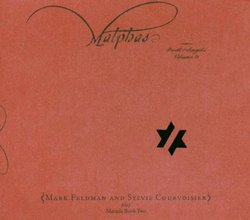| All Artists: Feldman, Courvoisier Title: Malphas: Book of Angels 3 Members Wishing: 1 Total Copies: 0 Label: Tzadik Original Release Date: 1/1/2006 Re-Release Date: 1/24/2006 Genres: Jazz, New Age, Classical Styles: Avant Garde & Free Jazz, Vocal Jazz, Opera & Classical Vocal, Historical Periods, Modern, 20th, & 21st Century Number of Discs: 1 SwapaCD Credits: 1 UPC: 702397735427 |
Search - Feldman, Courvoisier :: Malphas: Book of Angels 3
 | Feldman, Courvoisier Malphas: Book of Angels 3 Genres: Jazz, New Age, Classical
|
Larger Image |
CD Details |
CD ReviewsWhere the chamber music tradition should be going. Michael Stack | North Chelmsford, MA USA | 02/02/2006 (4 out of 5 stars) "In late 2004, John Zorn breathed new life in his Masada project by composing some 300 new pieces in the form-- themes written using the so-called Jewish scales as a springboard for improvisation. He refers to this as Masada Book II: The Book of Angels, with each piece given the name of a Biblical angel. But rather then gearing this project towards a particular band as the first Masada songbook did, Zorn instead decided this time around the book would be the star and different ensembles would perform the material from it. Three volumes into the series, the net result thus far has been an consistently (and perhaps somewhat unnervingly) high quality of performances.
Case in point: Mark Feldman and Sylvie Courvoisier's duet album, "Malphas". Feldman and Courvoisier are no strangers either to each other or Zorn's Masada concept-- the pair have performed together going as far back as 1999, either in duo or part of the trio Abaton with cellist Erik Friedlander, Feldman is a member of the Masada String Trio and the Bar Kokhba ensembles and has a decade long association with the first Masada songbook, and the pair recorded an album in duet form of Masada pieces in 2004 (the excellent "Masada Recital"). Net result: this is a duo that is interacting on a near-psychic basis not only with each other but also with the material. The Tzadik website billed this as "a whole new all-encompassing direction for classical music", and while this may be a bit extensive, it'd be nice if it were true. The second Masada songbook feels much more varied then the first-- the material covers quite a bit of ground and with interpreters who are comfortable in any of the domains between jazz and classical, it covers ranges from an almost baroque dynamicism ("Azriel") to cartoony explosions ("Kafziel"), folks rhythms ("Sammael") to minimalist scratchings ("Paschal"), neoclassical meets Cecil Taylor ("Basus") to almost straight chamber ("Labariel"). In many ways, it feels like what the whole "third stream" should have been in the first place. I'm inclined to only give it four stars simply because the Masada String Trio record that preceeded this was so unfailingly brilliant that it's a tough piece to live up to, but this is an exciting, varied and fantastic album. Recommended." |

 Track Listings (11) - Disc #1
Track Listings (11) - Disc #1